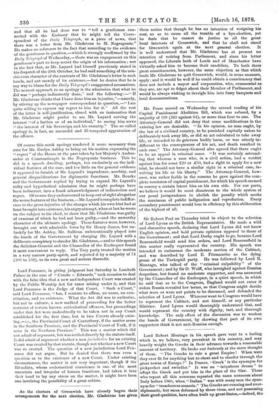Lord Penzance, in giving judgment last Saturday in Lambeth Palace
in the case of " Combe v. Edwards," took occasion to deal with the false idea that a new and independent Court was created by the Public Worship Act for cases arising under it, and that Lord Penzance is the Judge of that Court. "Such a Court," said Lord Penzance, "has, I venture to affirm, no name, no con- stitution, and no existence. What the Act did was to authorise, but not to enforce, a new method of proceeding for the better restraint of certain known ecclesiastical offence; but proceedings under that Act were undoubtedly to be taken not in any Court established for the first time, but in two Courts already exist- ing, —i.e., the Provincial Court of Canterbury, if the matter arose in the Southern Province, and the Provincial Court of York, if it arise in the Northern Province." This was a matter which did not admit of argument, but was settled directly by the statute itself. It did admit of argument whether a new jurisdiction for an existing Court was created by that statute, though not whether a new Court was so created. The question of a new jurisdiction Lord Pen- zance did not argue. But he denied that there was even a question as to the existence of a new Court. Under existing circumstances, the matter is not very important, though if the Ritualists, whose ecclesiastical conscience is one of the most uncertain and irregular of human functions, had taken it into their head to lay any stress on the matter, it might have been one involving the possibility of a great schism.


































 Previous page
Previous page